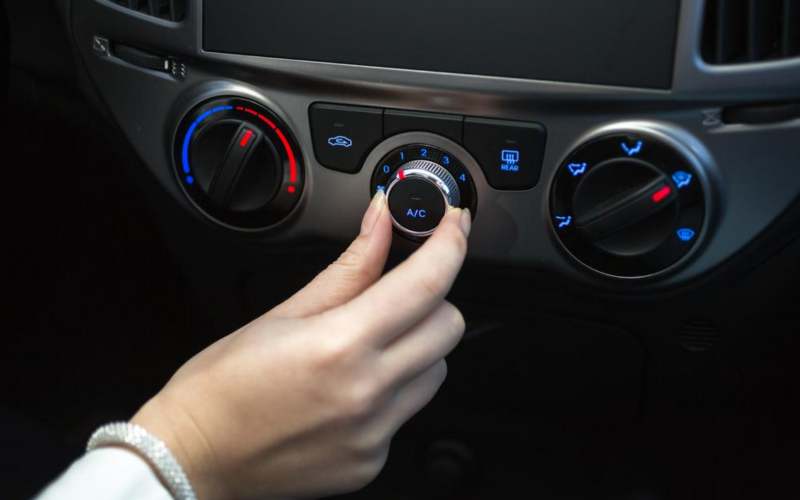Picture this: you’re cruising down the highway on a hot summer day, enjoying the cool breeze from your car’s air conditioning. But suddenly, disaster strikes – your car starts overheating.
It’s a frustrating and inconvenient situation that many of us have experienced. But have you ever wondered why your car overheats when the AC is on?

My car tends to overheat whenever I have the AC turned on. To prevent this, I’ve learned a few simple tricks. Firstly, I make sure my coolant levels are topped up regularly. This ensures that the engine stays cool. Secondly, I keep an eye on the radiator fan to make sure it’s functioning correctly. If it’s not, I replace it immediately. Lastly, I check the AC compressor to ensure it’s not putting too much strain on the engine. These steps have helped me avoid overheating when using the AC.
The Causes and Solutions for Car Overheating When the AC is On
Introduction
Car overheating can be a frustrating and potentially dangerous issue, especially when it occurs while the air conditioning (AC) is on. Driving in hot weather or stop-and-go traffic with a malfunctioning cooling system can lead to engine damage and breakdowns.
Understanding the causes and solutions for car overheating when the AC is on is crucial for maintaining your vehicle’s performance and extending its lifespan.
Insufficient Cooling System Capacity
The cooling system in a car is responsible for regulating the engine’s temperature by dissipating heat. However, when the AC is turned on, it adds an extra load to the engine, which requires the cooling system to work harder. If the cooling system doesn’t have sufficient capacity to handle this additional load, the engine can overheat.
Several factors can contribute to insufficient cooling system capacity. One common issue is a malfunctioning radiator fan, which fails to provide adequate airflow to cool the radiator.
Clogged or damaged radiator fins can also restrict airflow. Additionally, low coolant levels or a malfunctioning water pump can hinder the cooling system’s ability to cool the engine efficiently.
To address these issues, it is important to regularly maintain your car’s cooling system. Ensure that the radiator fan is functioning properly and clean any debris or dirt from the radiator fins.
Regularly check and replenish coolant levels, and if necessary, replace the water pump. Performing these maintenance tasks can help prevent overheating when the AC is on.
Signs of Insufficient Cooling System Capacity
There are a few signs that indicate your car’s cooling system may not have sufficient capacity to handle the added load of the AC. These signs include:
- Rapid increase in engine temperature gauge
- The engine temperature gauge reaching the red zone
- Steam or smoke coming from the engine compartment
- AC blowing warm air
If you notice any of these signs, it is essential to address the cooling system issue promptly to prevent engine damage.
Refrigerant Leaks in the AC System
The AC system in your car requires refrigerant to cool the air. If there is a refrigerant leak, it can not only affect the AC’s performance but also cause the engine to overheat.
When there is a refrigerant leak, the AC compressor works harder to compensate for the lost refrigerant, drawing additional power from the engine and placing a strain on the cooling system.
Refrigerant leaks can occur due to various reasons, such as damaged AC hoses, loose fittings, or worn-out seals. It is crucial to identify and repair any leaks to prevent ongoing issues with the AC system and avoid engine overheating. A professional mechanic can conduct a thorough inspection of the AC system, detect any leaks, and make the necessary repairs.
Signs of Refrigerant Leaks
There are a few signs that indicate a refrigerant leak in the AC system. These signs include:
- AC blowing warm or hot air
- Hissing sound coming from the AC system
- Foul odor when the AC is turned on
- Visible refrigerant stains or oil residue on AC components
If you notice any of these signs, it is essential to have your AC system inspected and repaired by a qualified professional.
Malfunctioning AC Compressor
The AC compressor is a vital component of the AC system, responsible for pressurizing refrigerant and circulating it through the system.
If the AC compressor malfunctions, it can place excessive load on the engine, causing it to work harder and generating more heat. This increased thermal load can lead to engine overheating, especially in hot weather or when driving in traffic.
Several factors can contribute to a malfunctioning AC compressor, such as a worn-out clutch, failing seals, or electrical issues.
If you suspect a problem with your AC compressor, it is crucial to have it inspected and repaired by a professional mechanic specialized in AC systems. They can diagnose the issue and determine the appropriate repairs or replacements.
Signs of a Malfunctioning AC Compressor
There are a few signs that indicate a malfunctioning AC compressor. These signs include:
- Unusual noises coming from the AC system
- Frequent or premature AC system failures
- Poor cooling performance even when the AC is on
- Engine struggling or overheating when the AC is on
If you experience any of these signs, it is important to have your AC compressor inspected by a professional to prevent further damage.
Insufficient Airflow through the Radiator
The radiator plays a crucial role in cooling the engine by dissipating heat. However, insufficient airflow through the radiator can impede its cooling performance, especially when the AC is on.
When the AC is running, the radiator needs an adequate supply of cooler outside air to maintain optimal engine temperature.
Several factors can contribute to insufficient airflow through the radiator. One common issue is a malfunctioning radiator fan, which fails to provide sufficient airflow.
Clogged or damaged radiator fins can also restrict airflow. Additionally, a blocked or dirty air intake grille can impede the flow of outside air into the radiator.
To address insufficient airflow through the radiator, it is important to regularly inspect and maintain the radiator fan and fins.
Clean any debris or dirt that may be blocking the airflow and ensure the air intake grille is free from obstructions. Regular maintenance can help optimize the radiator’s cooling performance and prevent engine overheating with the AC on.
Signs of Insufficient Airflow through the Radiator
There are a few signs that indicate insufficient airflow through the radiator. These signs include:
- Engine temperature gauge rising quickly
- AC system struggling to cool the air
- The engine temperature returning to normal when the AC is turned off
- Burning smell coming from the engine compartment
If you notice any of these signs, it is essential to address the airflow issue promptly to prevent engine damage.

Preventing Car Overheating When the AC Is On
Car overheating when the AC is on can be a serious problem, but there are steps you can take to prevent it:
- Maintain regular cooling system maintenance, including checking and replenishing coolant levels, inspecting the radiator fan, and cleaning radiator fins.
- Have your AC system inspected by a professional regularly to detect and repair any refrigerant leaks.
- Address any issues with the AC compressor promptly by seeking professional repairs or replacements.
- Regularly inspect and clean the air intake grille to ensure sufficient airflow through the radiator.
- Monitor the engine temperature gauge while driving with the AC on and pull over if it reaches the red zone or shows signs of overheating.
By following these preventive measures, you can minimize the risk of car overheating when the AC is on and ensure a safer and more pleasant driving experience.
What Causes a Car to Overheat When the AC is On?
When driving in hot weather, it can be frustrating for your car to overheat, especially when the air conditioning (AC) is on. Several factors can contribute to this issue:
- Faulty cooling system: A malfunctioning radiator, thermostat, water pump, or fans can disrupt the cooling system’s ability to dissipate heat effectively.
- Low coolant level: Insufficient coolant can lead to inadequate heat transfer and cause the engine to overheat.
- AC compressor issues: If the AC compressor is failing or damaged, it can put extra strain on the engine, leading to overheating.
- Blocked condenser: A clogged or dirty condenser obstructs airflow and reduces the AC’s cooling efficiency, causing the engine to work harder and overheat.
- Insufficient airflow: A broken fan or blocked air intake can limit airflow through the radiator and prevent proper cooling.
If your car overheats when the AC is on, it is essential to address the issue promptly to prevent further damage. Consider getting your cooling system inspected by a professional mechanic to identify and fix the underlying problem.
Additionally, make sure to maintain proper coolant levels and keep the condenser and radiator clean to ensure optimal performance.
Frequently Asked Questions
Q1: Why does my car overheat when I turn on the AC?
When you turn on the AC, your car’s engine has to work harder to power the AC compressor. This increases the load on the engine, causing it to generate more heat.
If your car’s cooling system is not functioning properly or if there is a lack of coolant, the increased heat can lead to overheating.
It’s important to ensure that your car’s cooling system is in good condition and that there is enough coolant to keep the engine temperature regulated while the AC is running.
Q2: Can a faulty thermostat cause my car to overheat when the AC is on?
Yes, a faulty thermostat can contribute to your car overheating when the AC is turned on. The thermostat is responsible for regulating the flow of coolant into the engine. If it is stuck closed or not functioning correctly, it can impede the proper circulation of coolant and cause the engine to overheat.
If you suspect a faulty thermostat, it is advisable to have it checked and replaced if necessary in order to prevent overheating issues.
Q3: Could a clogged radiator be the reason for my car overheating with the AC on?
A clogged radiator can definitely contribute to your car overheating when the AC is on. The radiator is responsible for cooling the coolant before it recirculates back into the engine. If it is clogged with dirt, debris, or sediment, it hinders the cooling process and leads to overheating.
Regular maintenance, including flushing and cleaning the radiator, can help prevent clogging and ensure proper cooling of the coolant.
Q4: Is a malfunctioning cooling fan a possible cause of my car overheating with the AC on?
A malfunctioning cooling fan can definitely be a cause of your car overheating when the AC is turned on. The cooling fan helps dissipate heat from the radiator by blowing air across it. If the fan is not working properly, the radiator won’t receive sufficient airflow, resulting in overheating.
If you notice that your car’s cooling fan is not functioning as it should, have it inspected and repaired or replaced if necessary to avoid overheating issues.
Q5: What are some other possible causes of a car overheating when the AC is on?
Aside from the previously mentioned reasons, other possible causes of a car overheating when the AC is turned on include:
- A malfunctioning water pump
- A leaking coolant hose
- A malfunctioning temperature sensor
- Insufficient airflow to the radiator
If you are experiencing overheating issues, it is recommended to have your car inspected by a professional mechanic to accurately diagnose and address the underlying problem.
Conclusion
So, in conclusion, if your car is overheating when the AC is on, there are a few potential causes to consider. One possibility is a problem with the cooling system, such as a faulty radiator or a clogged coolant hose.
Another factor could be a malfunctioning thermostat, as it regulates the engine’s temperature. Lastly, a worn-out water pump might not be circulating coolant properly, leading to overheating.
